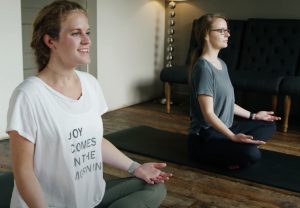How to Maintain Eating Disorder Recovery During Summer
Body Image, Eating Disorder Recovery, and Summertime.
Is it me, or does Diet Culture pressure always seems louder during beach season?

Maintaining recovery from an eating disorder is a lifetime journey. Depending on where you’re at in your recovery, making recovery-based choices may take a lot of effort. There are certain times of year that tend to be extra triggering. Summer is one of those times.
Eating Disorder Recovery, Body Image, and Diet Culture
Summer is often difficult for those who wrestle with eating disorders because of our society’s obsession with being thin. This message is so apparent all the time on social media. But in the summertime, it’s even more in your face because of the pressure to be “swimsuit ready.” It’s as if the entire season becomes about body image and making sure your body looks good enough to feel comfortable doing summer activities like beach trips or pool parties.
This can be stressful for anyone, but it can be extremely difficult for people with eating disorders. A negative body image is a common factor for those struggling with an eating disorder. Body image is the way someone feels about the way their body looks. People who struggle with disordered eating are likely to feel extremely anxious or distressed during bad body image moments. This can trigger a relapse, especially right before and during the summer months, when body image is at the forefront of everyone’s mind.
 Body Image and Eating Disorder Relapse
Body Image and Eating Disorder Relapse
This can be stressful for anyone, and for people with eating disorders, it can be extremely difficult. Negative body image is one of the biggest things that can lead someone to develop an eating disorder. Body image is the way someone feels about the way their body looks. People who struggle with disordered eating are likely to feel extremely anxious or distressed during bad body image moments. This can trigger a relapse, especially during seasons where body image is at the forefront of everyone’s mind.
Consistency is Important for Recovery
Maintaining recovery from an eating disorder tends to require some consistency. Whether it’s regular sessions with a therapist and dietitian or having a meal plan, recovery-oriented routines can be helpful. These routines can get disrupted by summertime activities like vacations or social events. And while a break from school stress can be exciting, having free time can make it all too easy to dwell on your eating disorder struggle or to grow a bit disillusioned and slip back into disordered behaviors.
Create a Recovery Maintenance Plan
Here is our message of hope: Summer does not have to lead to a relapse or be spent feeling like you’re treading water. You can keep moving forward in your recovery. It will require some thoughtfulness and commitment, but it’s possible. Here are some tips on how to protect your recovery during summertime:
Meet with an eating-disorder dietitian
Schedule a meeting with a dietitian now to learn how you can stay committed to regular, balanced meals and snacks over the summer break. A dietitian can help you make a meal plan. A meal plan is not a strict diet. Instead, it’s basically a roadmap for balanced, nutritious, and enjoyable meals.

Make a relapse prevention plan
Recovery isn’t linear and setbacks are really common for eating disorders. This doesn’t mean that slip-ups have to lead to a full relapse, though. If you know that summer is a difficult time for you, be prepared to protect your recovery with a relapse prevention plan. A relapse prevention plan usually includes a few core things. These are:
- List of triggers: Think about what led you to engage in eating disorder behaviors in the past. Was it certain events or emotions? Make a list of your triggers. Knowing what they are can help you be prepared to tackle them head-on without relying on the eating disorder. Also think about the unique things about summer that may be triggering for you.
- Coping Skills: After you figure out what your triggers are, think about what coping skills you can use to cope with them. It can be helpful to have several different coping skills in your toolbox. If you aren’t sure what to do to cope, reach out to a therapist or attend an eating disorder support group.
- Support Network- Sometimes we just need help from someone else. That’s super normal and okay. Think about who you can reach out to if you’re having a difficult time and need support.
Celebrate Wins of All Sizes
It’s important to address even the smallest setbacks in order to maintain your hard-earned recovery. It’s also important (and only fair!) to celebrate the smallest victories, whether that’s keeping an appointment with your care team, throwing away those nagging “goal-weight” outfits, or sticking to a new self-care routine.
Recovery is not about arriving at a singular destination or simply deciding not to relapse. Many’ successful recoveries are built on the persistence, strength, and resolve gained after stumbling. Acknowledging and celebrating your achievements can provide the encouragement you need to build trust in the process and keep going.
Develop a Plan to Cope with Change
Sometimes life does not work out the way we hope. We all learned that during the last year. 2020 was a time of massive change that no one was prepared for. The COVID-19 health crisis was stressful, scary, and devastating for many people. As things begin to open up more, it’s normal to feel anxious.
For this reason, this summer may be more triggering than previous summers. It can be stressful to reenter social situations after we’ve all been told to stay home for the last year. This can be especially difficult for people in eating disorder recovery. This added layer of stress on top of an already difficult time of year can be hard to manage.
Life is also filled with changes. Travel plans can change. A summer internship might fall through. Work with your therapist to develop a good plan for coping with the unexpected. Whether it’s breathing techniques, yoga, mindfulness, or whatever else works for you, it’s important to have a plan for how you can cope with change so that stress doesn’t take over.
Allow Yourself to Have Fun
We all deserve some serious fun after the last year. Plus, that’s what summer is supposed to be about, right? Recovery may take a lot of energy, so having fun is important and a good way to do some self-care. Think about what you would want to do if you weren’t focused on body image or caught up in eating disorder behaviors. What would you be doing? Do that instead.
Eating disorder recovery is not linear. Setbacks happen, but they don’t have to trigger a relapse. Give yourself grace, surround yourself with support, and try to view challenges as part of the process rather than indications of failure.
Relapse Prevention Programs at Alsana
If you or a loved one have been struggling to maintain recovery, help is available. Alsana offers Two-Week Intensive Programs for relapse prevention, with flexible virtual and in-person scheduling options. Learn More.
Start the road to recovery with Alsana.

 Body Image and Eating Disorder Relapse
Body Image and Eating Disorder Relapse





